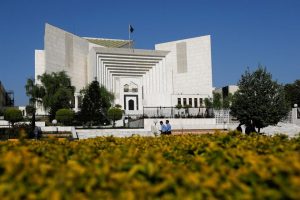CJ anticipates a short hiatus in military prosecutions.
The government has been ordered to allow suspects in army custody to visit with family members.

ISLAMABAD — On Monday, the country’s top judge ordered the government to allow suspects under the army’s custody to meet their families. He also said he “expected” that military courts would not hold trial of any of the alleged May 9 rioters until the Supreme Court decided petitions challenging the trials.
Why aren’t the detainees [in military custody] permitted to visit with their loved ones? It’s been a long time since what happened on May 9, the Chief Justice of Pakistan told Pakistan’s AGP Mansoor Awan.
We’ve also heard that the suspects aren’t getting enough to eat or any reading materials. Tell us what the government tells you to do about setting up suspects’ visits with their families, he urged.
On Monday, the CJ presided over a seven-member bench that continued hearing petitions against court martial of those accused of vandalising and setting fire to army facilities and memorials following the arrest of PTI chief Imran Khan on May 9.
Justice Mansoor Ali Shah is related to one of the petitioners, former CJP Jawwad S. Khawaja, and as the hearing began, AGP Awan took the rostrum to inform the bench of the government’s request for Justice Mansoor Ali Shah to recuse himself from hearing the case.
Justice Shah and the other judges on the bench looked noticeably annoyed by the announcement. The chief judge assured the AGP that the court benches would not be arranged according to their wishes. Justifications for challenging Justice Mansoor Ali Shah? He said that the judge’s abilities were beyond question.
Moreover, the CJP noted, the government has objected to the bench hearing petitions against the delay in holding elections in the Punjab state.
According to him, retired Justice Jawwad S. Khawaja is a model human being. If Justice Shah heard the case, what good could he do Khawaja? Is the administration aiming to stir up controversy with its choice of bench?
The government ignored the Supreme Court’s April 4 order to hold elections in Punjab and Khyber Pakhtunkhwa on May 14, and he said the court was showing prudence by not taking harsh measures against the rulers. He said that carrying out the ruling is the government’s moral obligation.
He claimed the court lacked the “coercive power of a baton” to carry out its rulings. To paraphrase, “Many people have this baton [of authority], but what is their moral authority?”
Justice Shah responded to the government’s plea by saying, “I am aware of my conduct as a Supreme Court judge.” If someone points a finger at me from a bench, I will have to get up and go. Justice Shah said he will withdraw himself from the case because he “cannot remain part of this bench.”
Latif Khosa, who represents Aitzaz Ahsan, one of the primary petitioners, said that this was a sad day for Pakistan’s legal system. Advocate Salman Akram Raja, representing another petitioner, made a similar appeal before the judge.
“This is a case about basic rights; there is no justification for objecting to a bench in such cases,” he argued. In response to Justice Shah’s recusal, the other judges stood.
After a short break, a six-member panel began hearing the case, and Salman Akram Raja argued that only a judge nominated under Article 175 of the Constitution could hold a trial of a civilian.
The Chief Justice pleaded with the attorney to avoid further complications. Several courts and tribunals exist outside of those authorised by Article 175, as pointed out by Justice Ayesha Malik.
If Raja’s argument is upheld, then even the military cannot court-martial its own members, as pointed out by Justice Munib Akhtar.
The attorney categorised civilians into two groups: those who work directly with the military and those who do not.
The former must adhere to military regulations, whereas the latter can only be tried in a court of law. He argued that bringing them before military courts was against the constitution.
At one point in the hearing, Justice Bandial asked Uzair Bhandari, the lawyer representing Imran Khan and one of the petitioners, to refrain from discussing “political goals and aspirations” and instead focus on the case at hand.
After the court adjourned until June 27 [today], he asked the AGP to let the suspects from May 9 see their relatives. A written order was later issued, and it included a note from Justice Shah.
Note from Justice Shah
In a constitutional court, Justice Shah said, a judge must follow his conscience when deciding whether or not to recuse himself from hearing a case, but he must also keep in mind that the public must have faith in the court’s impartiality.
For the appearance of his partiality would dishonour not only him but the institution he serves. Insisting on impartiality in the appearance of justice is not an attempt to cover up flaws in the legal system, but rather a necessary step towards achieving justice in practise.
“The public legitimacy of judicial pronouncements and, by extension, the rule of law, requires both the appearance and the reality of impartial justice.”
“Judicial independence preserves public faith, fosters legal certainty, guarantees a fair trial, supports the rule of law, and protects democracy.” Therefore, the notion of judicial impartiality is not just a moral requirement for doing justice, upholding democratic norms, protecting citizens’ rights, and maintaining social order; it is an absolute necessity.









































